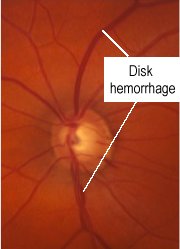Glaucoma Increases Risk of Other Health Conditions
Vitamins/supplements Symptoms & Causes
Glaucoma may boost cardiovascular death risk in blacks
 African-Americans have higher rates of open-angle glaucoma, high pressure in their eyes and higher rates of death from chronic disease than whites. In a study including 300 subjects surveyed over
nine years, that while glaucoma was not associated with higher rates of death overall, they did note that:
African-Americans have higher rates of open-angle glaucoma, high pressure in their eyes and higher rates of death from chronic disease than whites. In a study including 300 subjects surveyed over
nine years, that while glaucoma was not associated with higher rates of death overall, they did note that:
"... the risk of cardiovascular death was: 28 percent higher in those with ocular hypertension at the start of the study; 38 percent higher in people who'd previously been diagnosed with or treated for open angle glaucoma; and 91 percent higher in those who'd been treated with a beta blocker drug called timolol maleate."
The researchers also pointed out that inappropriate use of or side effects from medications used to treat glaucoma may damage the cardiovascular system. March, 2008, Archives of Ophthalmology
Glaucoma more common in cardiovascular mortality
Findings from the Blue Mountains Eye Study demonstrate an increased risk of death from cardiovascular problems in persons with previously diagnosed glaucoma. There was a suggestion of higher cardiovascular mortality in glaucoma patients using topical timolol that merits further study.
Glaucoma increases risk of falls and auto accidents
A study in Halifax reviewed 48 patients with glaucoma and 47 age-matched controls without glaucoma, excluding people in nursing homes, or other significant sensory impairment or eye disease. The patients with glaucoma were on medications and more than half of them had corrective surgery. They were three times more likely to have fallen in the past 12 months compared to the control group, and six times more likely to have been in an auto accident, and 12 times more likely to have been at fault despite driving fewer kilometers per week.3
Open Angle Glaucoma increases the risk of stroke
A 2009 study of about 24,000 people over a 5 year period found that patients with OAG are 1 1/2 times as likely to suffer a stroke.1
Open Angle Glaucoma & Alzheimer's
Studies and literature reviews have found that women with Alzheimer's had a higher rate of open-angle glaucoma.2, 6 Other reviewers suggested that in one study the connection is more accurately tied to patients with pseudoexfoliation which is caused by certain gene mutations.5
Optic Disk Hemorrhage

Optic disk hemorrhages occur when blood hemorrhages appear running right across the retina. While the exact cause is still under investigation, they do occur more often in glaucoma patients diagnosed with normal tension glaucoma - this is glaucoma without high intraocular pressure. A study of more than 300 patients including glaucoma patients with normal tension glaucoma and disk hemorrhage, patients with normal-tension glaucoma and no disk hemorrhages, and health controls found that there was a marked association between having both normal tension glaucoma and disk hemorrhages.4
Sources & Footnotes
1. Open-angle glaucoma & the risk of stroke development: a 5-year population-based follow-up study, JD
Ho & associates, Teipai Medical University, Stroke. 2009 Aug;40(8):2685-90.
2. Dementia is associated with open-angle glaucoma: a population-based study. S-D Chung, et al., Eye, July, 2015
3. Haymes SA, LeBlanc RP, Nicolela MT, Chiasson LA, Chauhan BC, Risk of falls and motor vehicle collisions in glaucoma, Investigations in Opthalmology and Visual Sciences, 2007; 48:1149-55
4. S.H. Shim, et al, Association Between Platelet Function and Disc Hemorrhage in Patients With Normal-Tension Glaucoma: A Prospective Cross-Sectional Study, American Journal of Ophthalmology,
September, 2014.
5. S.F. Janssen, et al, Systematic review of the association between Alzheimer's disease and chronic glaucoma, Clinical Ophthalmology, May, 2015
6. Tsilis, et al, Systematic review of the association between Alzheimer's disease and chronic glaucoma, Clinical Ophthalmology, October, 2013
Research and information
See Research on glaucoma.
 info@naturaleyecare.com
info@naturaleyecare.com



 Home
Home



 Vision
Vision Vision
Vision



 Health
Health Health
Health Research/Services
Research/Services Pets
Pets About/Contact
About/Contact


